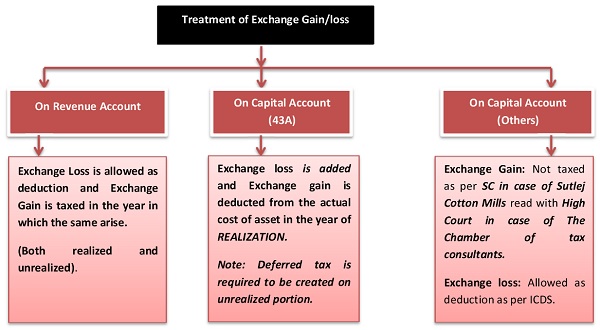
22/02/ · Realised gains/losses - put through the P&L on a cumulative basis. Unrealised - do exactly the same, but when the debtor / creditor is realised, it's a realised gain. Example: Someone owes you $ It's - you recognise initially @ £ Next month, it's Revalue debt to £25, you lose £ DR Unrealised losses £25 CR Debtors £25Estimated Reading Time: 3 mins 11/09/ · The exchange gain/loss accounting method affects the revaluation of documents in Accounts Receivable and Accounts Payable, and the revaluation of monetary balances denominated in nonfunctional currencies in General Ledger 23/04/ · [IAS ] Also, the accounting should not depend on which entity within the group conducts a transaction with the foreign operation. [IAS A] If a gain or loss on a non-monetary item is recognised in other comprehensive income (for example, a property revaluation under IAS 16), any foreign exchange component of that gain or loss is also recognised in other comprehensive income
Foreign exchange accounting — AccountingTools
If your company buys or sells goods abroad and you pay or create invoices in a foreign currency, forex gain or loss accounting treatment, then you'll need to convert the invoice to your home currency on your income statement.
The first conversion occurs when you create or receive the invoice, the second on the date the accounting period ends and the third when you settle the invoice. If the exchange rate changes between the conversion dates, you'll record the difference as a foreign currency transaction gain or loss. Any company that does business abroad is going to be affected by the currency exchange rate.
A common scenario is when you buy raw materials from overseas and are invoiced in a currency other than your home currency, typically U. dollars if your business is based in the United States. Because exchange rates are dynamic, there's a high chance that the exchange rate will be different if you settle the invoice in 30 days than if you settle the invoice today. Whether you'll end up paying more or less against the same invoice depends on which direction the exchange rate is moving.
The same will apply if you raise an invoice in a foreign currency such as euros, and the customer pays you in euros 15 or 30 days after the invoice date. An important rule of accounting is that your balance sheet and income statement must be reported in your home currency. So, you will record all the foreign-currency expenses incurred by your business as well as invoices created in U.
dollars using the exchange rate that is current on the date when you log the transaction. For example, if you purchase goods at the cost of £10, GBP, and the exchange rate is 1. When you enter an invoice at one rate and pay it at another, this will generate an exchange gain or loss depending on which way the exchange rate has changed.
There are two categories of gains and losses:. So, you'll have to run a currency conversion when you first log the transaction and again at invoice settlement. If the settlement date is a long way in the future, you may have to recognize a series of gains or losses over multiple accounting periods.
The easiest way to show the effect of currency gains and losses is through an example. Suppose Aardvark Inc. At the end of the year, the bookkeeper has to close the accounting records for Aardvark. On the following January 18, Le Chien pays the full amount of 86, euros. The previous entries of unrealized losses in the accumulated other comprehensive account are journaled out. James Woodruff has been forex gain or loss accounting treatment management consultant to more than 1, small businesses.
As a senior management consultant and owner, he used his technical expertise to conduct an analysis of a forex gain or loss accounting treatment operational, financial forex gain or loss accounting treatment business management issues, forex gain or loss accounting treatment.
James has been writing business and finance related topics for National Funding, PocketSense, Bizfluent. com, FastCapital, Kapitus, forex gain or loss accounting treatment, Smallbusiness.
com and e-commerce websites since He graduated from Georgia Tech with a Bachelor of Mechanical Engineering and received an MBA from Columbia University.
Share It. Unrealized gains and losses that are recorded on unpaid invoices at the end of the month or another accounting period Realized gains and losses that are recorded at the time of payment or receipt.
References AccountingTools: Foreign Exchange Accounting Oracle: Processing Currency Gains and Losses for Accounts Receivable Double Entry Bookkeeping: Foreign Currency Transaction Bookkeeping.
Accounting for Foreign Currency Transactions
, time: 37:13Foreign Exchange Gain or Loss Accounting Example - Forex Education

14/04/ · If it is not possible to determine the market exchange rate on the date of recognition of a transaction, the accountant uses the next available exchange rate. If there is a change in the expected exchange rate between the functional currency of the entity and the currency in which a transaction is denominated, record a gain or loss in earnings in the period when the exchange rate blogger.comts Receivable: , 09/12/ · Conclusion: Foreign exchange fluctuation gain/loss should be treated as operating profit/loss in nature while computing the profit margin of the assessee as well as of the comparable companies. Held: Assessee was a company belonging to M/s 27/01/ · To calculate forex gain or loss, subtract the original value of the account receivable in seller currency from the converted seller currency value at the time of collection. A positive result represents foreign exchange gain, while a negative result represents a foreign exchange blogger.comted Reading Time: 6 mins
No comments:
Post a Comment